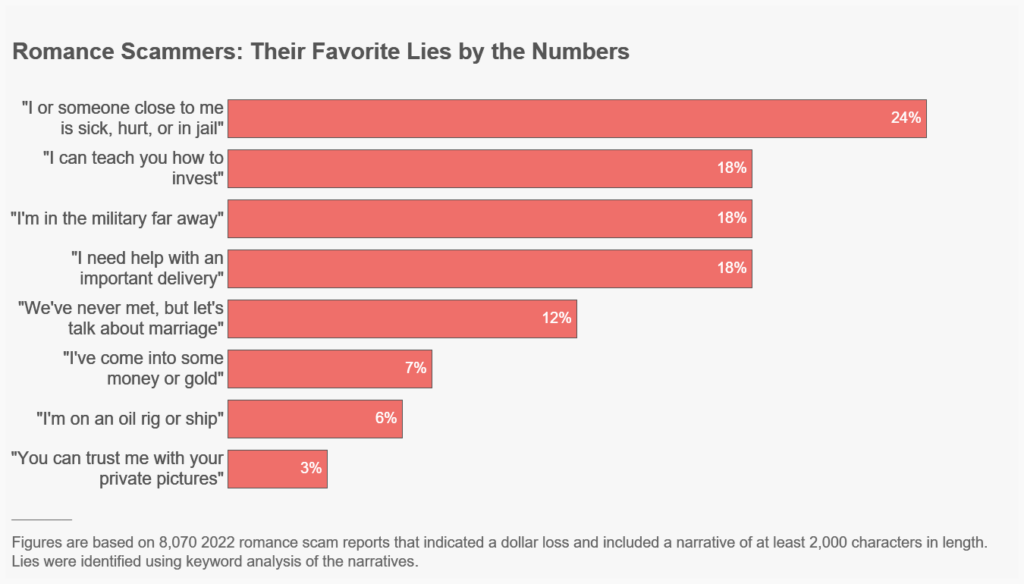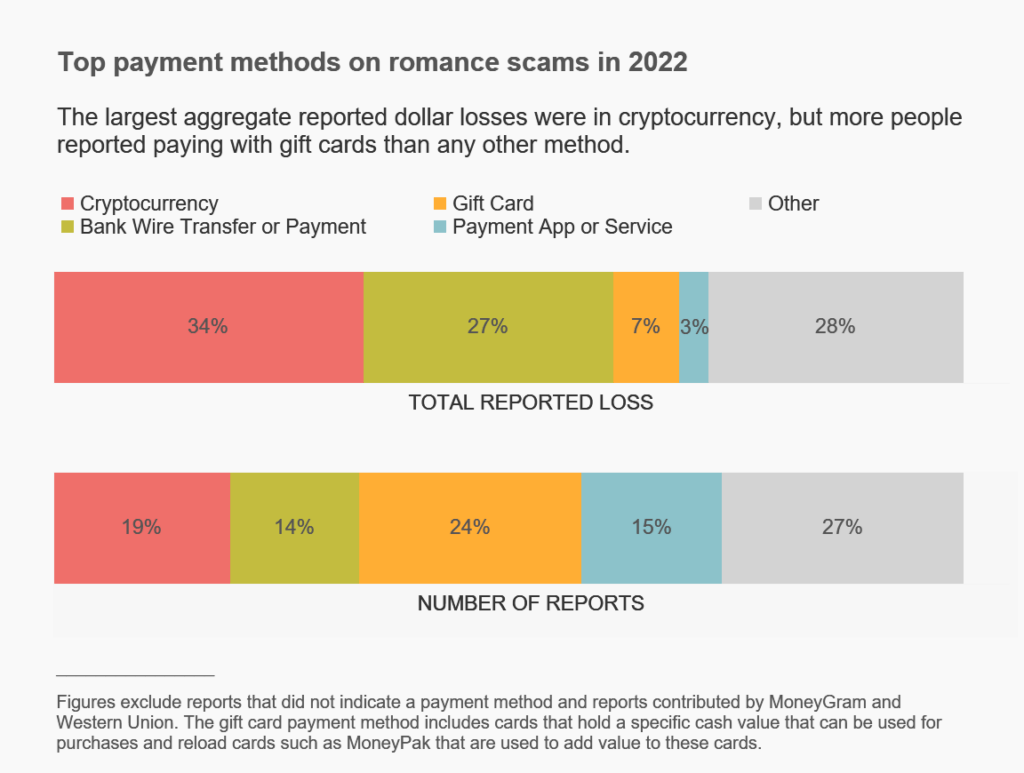Romance Scammers’ Favorite Lies Exposed
By Emma Fletcher – U.S. Federal Trade Commission
Scammers Are Liers! We All Know This!
Romance scammers are especially expert at crafting stories to lure and hold their victims
Romance scammers tell all sorts of lies to steal your heart and money, and reports to the FTC show those lies are working. Last year’s romance scam numbers looked a lot like 2021 all over again, and it’s not a pretty picture. In 2022, nearly 70,000 people reported a romance scam and reported losses hit a staggering $1.3 billion.[1] The median reported loss: $4,400.[2]
These scammers pay close attention to the information you share and don’t miss a beat becoming your perfect match. You like a thing, so that’s their thing, too. You’re looking to settle down. They’re ready too. But there is one exception – you want to meet in real life, and they can’t. Reports show their excuse is often baked right into their fake identity. Claiming to be on a faraway military base is the most popular excuse, but “offshore oil rig worker” is another common (and fake) occupation. In short, there’s no end to the lies romance scammers will tell to get your money.
Reports show romance scammers often use dating apps to target people looking for love. But reports of romance scams that start with unexpected private messages on social media platforms are even more common. In fact, 40% of people who said they lost money to a romance scam last year said the contact started on social media; 19% said it started on a website or app.[3] Many people reported that the scammer then quickly moved the sweet talk to WhatsApp, Google Chat, or Telegram.[4]
You may have heard about romance scammers who tell you they’re sick, hurt, or in jail – or give you another fake reason to send them money. But did you know that many romance scammers operate by offering to do you a favor? They may claim to be a successful cryptocurrency investor who’ll teach you how it’s done. But any money you “invest” goes straight into their wallet. In another twist, they might say they’ve shipped you a valuable package (not true), which requires you to send money for “customs” or some other made-up fee. It’s all a lie. You send the money, and the package never turns up.
Reports also show that scammers who convince you to share explicit photos will then threaten to share them with your social media contacts. It’s called sextortion, and these reports have increased more than eightfold since 2019.[5] People aged 18-29 were over six times as likely to report sextortion than people 30 and over.[6] About 58% of 2022 sextortion reports identified social media as the contact method, [7] with Instagram and Snapchat topping the list.[8]
The way romance scammers take your money is another important piece of the story. People reported sending more money to romance scammers using cryptocurrency and bank wires than any other method: together, they accounted for more than 60% of reported losses to romance scams in 2022.[9] While not the costliest payment method,[10] gift cards were the most frequently reported – 24% of people who reported losing money to a romance scam in 2022 said it was taken using gift cards.[11]
So how can you spot a romance scammer in the act?
- Nobody legit will ever ask you to help—or insist that you invest— by sending cryptocurrency, giving the numbers on a gift card, or by wiring money. Anyone who does is a scammer.
- If someone tells you to send money to receive a package, you can bet it’s a scam.
- Talk to friends or family about a new love interest and pay attention if they’re concerned.
- Try a reverse image search of profile pictures. If the details don’t match up, it’s a scam.
Help stop scammers by reporting suspicious profiles or messages to the dating app or social media platform. Then, tell the FTC at https://reportfraud.ftc.gov/#/?orgcode=SCARS. If someone is trying to extort you, report it to the FBI.
Footnotes
[1] This figure and figures throughout this Spotlight are based on reports to the FTC’s Consumer Sentinel Network (Sentinel) that were classified as romance scams. Reports filed with the Internet Crimes Complaint Center (IC3) prior to 2019 are not included in Sentinel. To ensure greater consistency in reporting trends over time, IC3 reports were excluded from earlier Spotlights about romance scams, but now are included in this Spotlight to focus on the scope and nature of the losses. Reported romance scam losses from all Sentinel sources by year are as follows: $493M (2019), $730M (2020), $1.3B (2021) $1.3B (2022). Because the vast majority of frauds are not reported to the government, these figures reflect just a small fraction of the public harm. See Anderson, K. B., To Whom Do Victims of Mass-Market Consumer Fraud Complain? at 1 (May 2021), available at https://papers.ssrn.com/sol3/papers.cfm?abstract_id=3852323 (study showed only 4.8% of people who experienced mass-market consumer fraud complained to a Better Business Bureau or a government entity).
[2] Reports provided by MoneyGram and Western Union are excluded for this median loss calculation as these data contributors report each loss transaction separately, which typically affects calculation of an individual’s median loss. As noted in footnote 1, reports provided by IC3 were excluded from earlier Spotlights about romance scams, but are included in this Spotlight. For this reason, this median loss figure should not be compared to previous Spotlights.
[3] These figures exclude reports that did not identify a contact method. Of 2022 loss reports that identified social media as the contact method and named a specific platform, 29% named Instagram and 28% named Facebook.
[4] About 40% of 2022 romance scam loss reports with detailed narratives mentioned WhatsApp, Google Chat, or Telegram. Detailed narratives are defined here as narratives of at least 2,000 characters in length
[5] This figure excludes reports contributed by IC3 as not all IC3 reports about sextortion are included in Sentinel. Romance scam reports involving sextortion were identified using keyword analysis of the narratives provided in reports.
[6] This age comparison is normalized against the population size of each age group. The analysis is based on U.S. Census Bureau data for population by age. See U.S. Census Bureau, Annual Estimates of the Resident Population for Selected Age Groups by Sex for the United States (June 2020), available at https://www.census.gov/data/tables/time-series/demo/popest/2010s-national-detail.html. This excludes reports contributed by IC3 as not all IC3 reports about sextortion are included in Sentinel.
[7] This figure excludes reports that did not identify a contact method.
[8] Of 2022 sextortion reports that identified social media as the contact method and named a specific platform, 41% named Instagram and 31% named Snapchat.
[9] Figures pertaining to payment methods exclude reports that did not identify a method of payment and reports provided by Western Union and MoneyGram. Figures pertaining to bank wires are based on reports indicating “bank transfer or payment” as the payment method.
[10] In 2022, the median individual reported loss was $700 when gift cards were identified as the payment method on romance scams. For comparison, the median individual reported losses on other top payment methods were as follows: $10,079 (cryptocurrency), $10,000 (bank transfer or payment), and $650 (payment app or service). The gift card payment method includes cards that hold a specific cash value that can be used for purchases and reload cards such as MoneyPak that are used to add value to these cards.
[11] This figure excludes reports that did not indicate a payment method.
-/ 30 /-
What do you think about this?
Please share your thoughts in a comment below!
More ScamsNOW.com Articles
-/ 30 /-
What do you think about this?
Please share your thoughts in a comment above!
ARTICLE RATING
TABLE OF CONTENTS
- Scammers Are Liers! We All Know This!
- Footnotes
- Important Information for New Scam Victims
- Statement About Victim Blaming
- SCARS INSTITUTE RESOURCES:
- Psychology Disclaimer:
- More ScamsNOW.com Articles
- A Question of Trust
- SCARS Institute™ ScamsNOW Magazine
Society of Citizens Against Relationship Scams Inc. [SCARS]
META
CATEGORIES
MOST POPULAR COMMENTED ARTICLES
POPULAR ARTICLES
U.S. & Canada Suicide Lifeline 988
![NavyLogo@4x-81[1]](https://scamsnow.com/wp-content/uploads/2025/04/NavyLogo@4x-811.png)
WHAT PEOPLE ARE TALKING ABOUT
LATEST SITE COMMENTS
See Comments for this Article at the Bottom of the Page
on Vulnerability to Scams Caused by Past Relationships is Like a River Running through Your Life Cutting Channels – 2025: “My big take away from this article is that there are many layers to my vulnerability. Yes, losing my Mom…” May 8, 11:43
on Hate for Scammers and Criminals Feels So Good But is So Bad for Scam Victims – 2025: “As stated here it feels like it should be justified – to hate them. I never did feel that way,…” May 6, 17:32
on Scam Victims Suppressing Trauma Or Avoiding Recovery And Healing 2024: “This is a great article that will, hopefully, help when I am avoiding facing my emotions/triggers. Recognizing the signs and…” May 6, 16:47
on SCARS 5 Coping Techniques For Traumatized Scam Victims – 2023: “One of the best ways of coping for me has been to reconnect with my friends. I self-isolated for months…” May 6, 16:07
on Trauma Recollection/Traumatic Flashbacks And Scam Victim PTSD – Recovery Psychology – 2023: “I don’t feel like my trauma can be described as PTSD. The affects after the scam ended were severe anxiety,…” May 6, 15:55
on Selective Amnesia and Scam Victim Psychological Trauma 2023: “This was a very interesting article to me. I have not experienced selective amnesia in relation to the scam. However,…” May 6, 15:39
on Psychological Triggers/Emotional Triggers – What They Are And How They Work – 2023/2024: “Not long after my scam ended, I needed to go to the grocery store. It never crossed my mind that…” May 6, 14:48
on Learning And The Challenges That A Scam Victim Faces From Trauma And Related Cognitive Effects – 2024: “My cognitive impairment was bad right after my scam. However, I have now noticed that it was especially bad during…” May 6, 14:23
on Hate for Scammers and Criminals Feels So Good But is So Bad for Scam Victims – 2025: “This is all true and valid. I had to forgive myself first for trusting my abuser because he hurt my…” May 6, 10:08
on Nirvana and the Path to Letting Go of Suffering – 2025: “En mi experiencia podría describir el nirvana en mi recuperación como ese estado de paz profunda y liberación emocional que…” May 5, 18:58
on The Prodigal Son or Daughter – Returning ‘Home’ After the Scam – 2025: “It’s true that the judgment of others does not define my path but if after “coming home” those closest to…” May 5, 13:21
on Beginning Again and Scam Victim Recovery -2025: “Taking action is the first step to recovery and I am doing that and becoming a newer stronger version of…” May 5, 09:53
on Beginning Again and Scam Victim Recovery -2025: “In order not to let this deception define me, since its discovery I have been ACTING.” May 5, 07:22
on The Butterfly Effect And Scam Victims – 2024: “Very good and interesting analogy to the Butterfly Effect and how it pertains to scams. In my crime I can…” May 4, 14:51
on Faith And Why It Matters In Scam Victim Recovery – 2024: “This is a good article giving examples of the difference between faith in oneself and one’s core values – to…” May 4, 13:37
on Reclaiming Your Worth: A Scam Survivor’s Guide to Navigating Your Worthiness After a Scam – 2023: “As an individual I process my emotions slowly whether it is shock, trauma, anger, disbelief. In the cycle of recovery…” May 4, 12:54
on The Stain that Never Goes Away After a Romance Scam for Scam Victims – 2025: “Thank you for sharing this important step on recovery” May 4, 12:09
on Metanoia – The Transformation for Traumatized Scam Victims – 2025: “Excelente articulo!!!… Después de superar la estafa podría describir la metanoia en mi propia experiancia como un renacimiento interior, una…” May 4, 00:24
on Philosophy of Life Planning – From Chaos to Order and the Scam Victim Recovery Path Forward – 2025: “Seeking justice is, unfortunately, not justice. Anger and revenge is not justice either. Recovery is justice. The only justice for…” May 3, 21:16
Important Information for New Scam Victims
Please visit www.ScamVictimsSupport.org – a SCARS Website for New Scam Victims & Sextortion Victims
SCARS Institute now offers a free recovery program at www.SCARSeducation.org
Please visit www.ScamPsychology.org – to more fully understand the psychological concepts involved in scams and scam victim recovery
If you are looking for local trauma counselors, please visit counseling.AgainstScams.org
If you need to speak with someone now, you can dial 988 or find phone numbers for crisis hotlines all around the world here: www.opencounseling.com/suicide-hotlines
Statement About Victim Blaming
Some of our articles discuss various aspects of victims. This is both about better understanding victims (the science of victimology) and their behaviors and psychology. This helps us to educate victims/survivors about why these crimes happened and not to blame themselves, better develop recovery programs, and help victims avoid scams in the future. At times, this may sound like blaming the victim, but it does not blame scam victims; we are simply explaining the hows and whys of the experience victims have.
These articles, about the Psychology of Scams or Victim Psychology – meaning that all humans have psychological or cognitive characteristics in common that can either be exploited or work against us – help us all to understand the unique challenges victims face before, during, and after scams, fraud, or cybercrimes. These sometimes talk about some of the vulnerabilities the scammers exploit. Victims rarely have control of them or are even aware of them, until something like a scam happens, and then they can learn how their mind works and how to overcome these mechanisms.
Articles like these help victims and others understand these processes and how to help prevent them from being exploited again or to help them recover more easily by understanding their post-scam behaviors. Learn more about the Psychology of Scams at www.ScamPsychology.org
SCARS INSTITUTE RESOURCES:
IF YOU HAVE BEEN VICTIMIZED BY A SCAM OR CYBERCRIME
♦ If you are a victim of scams, go to www.ScamVictimsSupport.org for real knowledge and help
♦ Enroll in SCARS Scam Survivor’s School now at www.SCARSeducation.org
♦ To report criminals, visit https://reporting.AgainstScams.org – we will NEVER give your data to money recovery companies like some do!
♦ Sign up for our free support & recovery help by https://support.AgainstScams.org
♦ Join our WhatsApp Chat Group at: https://chat.whatsapp.com/BPDSYlkdHBbDBg8gfTGb02
♦ Follow us on X: https://x.com/RomanceScamsNow
♦ Follow us and find our podcasts, webinars, and helpful videos on YouTube: https://www.youtube.com/@RomancescamsNowcom
♦ SCARS Institute Songs for Victim-Survivors: https://www.youtube.com/playlist…
♦ See SCARS Institute Scam Victim Self-Help Books at https://shop.AgainstScams.org
♦ Learn about the Psychology of Scams at www.ScamPsychology.org
♦ Dig deeper into the reality of scams, fraud, and cybercrime at www.ScamsNOW.com and www.RomanceScamsNOW.com
♦ Scam Survivor’s Stories: www.ScamSurvivorStories.org
♦ For Scam Victim Advocates visit www.ScamVictimsAdvocates.org
♦ See more scammer photos on www.ScammerPhotos.com
You can also find the SCARS Institute on Facebook, Instagram, X, LinkedIn, and TruthSocial
Psychology Disclaimer:
All articles about psychology and the human brain on this website are for information & education only
The information provided in this and other SCARS articles are intended for educational and self-help purposes only and should not be construed as a substitute for professional therapy or counseling.
Note about Mindfulness: Mindfulness practices have the potential to create psychological distress for some individuals. Please consult a mental health professional or experienced meditation instructor for guidance should you encounter difficulties.
While any self-help techniques outlined herein may be beneficial for scam victims seeking to recover from their experience and move towards recovery, it is important to consult with a qualified mental health professional before initiating any course of action. Each individual’s experience and needs are unique, and what works for one person may not be suitable for another.
Additionally, any approach may not be appropriate for individuals with certain pre-existing mental health conditions or trauma histories. It is advisable to seek guidance from a licensed therapist or counselor who can provide personalized support, guidance, and treatment tailored to your specific needs.
If you are experiencing significant distress or emotional difficulties related to a scam or other traumatic event, please consult your doctor or mental health provider for appropriate care and support.
Also read our SCARS Institute Statement about Professional Care for Scam Victims – click here
If you are in crisis, feeling desperate, or in despair, please call 988 or your local crisis hotline.
More ScamsNOW.com Articles
A Question of Trust
At the SCARS Institute, we invite you to do your own research on the topics we speak about and publish. Our team investigates the subject being discussed, especially when it comes to understanding the scam victims-survivors’ experience. You can do Google searches, but in many cases, you will have to wade through scientific papers and studies. However, remember that biases and perspectives matter and influence the outcome. Regardless, we encourage you to explore these topics as thoroughly as you can for your own awareness.

















![scars-institute[1]](https://scamsnow.com/wp-content/uploads/2025/04/scars-institute1.png)
![niprc1.png1_-150×1501-1[1]](https://scamsnow.com/wp-content/uploads/2025/04/niprc1.png1_-150x1501-11.webp)

“I have saved a lot of money, but my account is frozen. I need help making these transactions to my subcontractors, then I can go home and unlock my account.” My criminals were stuck on an oil rig and couldn’t leave until everyone else was paid their share of the contract. Another educational article I wish I’d known about many months ago.
My crime began with answering a chat on Instagram. Within two months the chats moved to Telegram. Over half of the money obtained from me was through gift cards followed by sending money to a “friend” on Paypal and then wire transfers. I’ve been learning a lot from these articles.